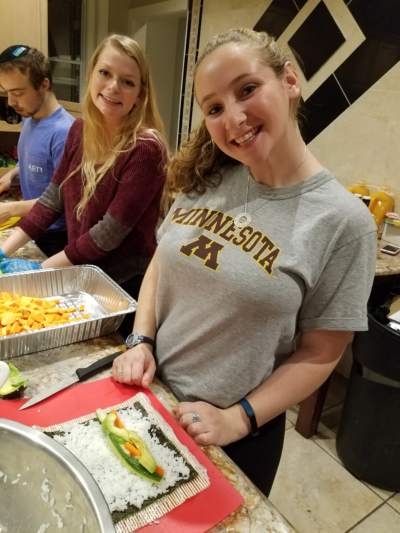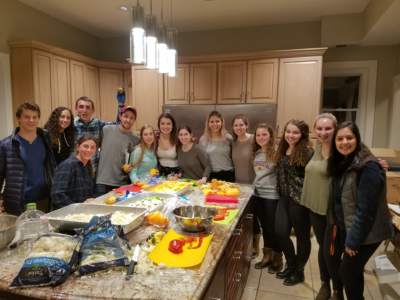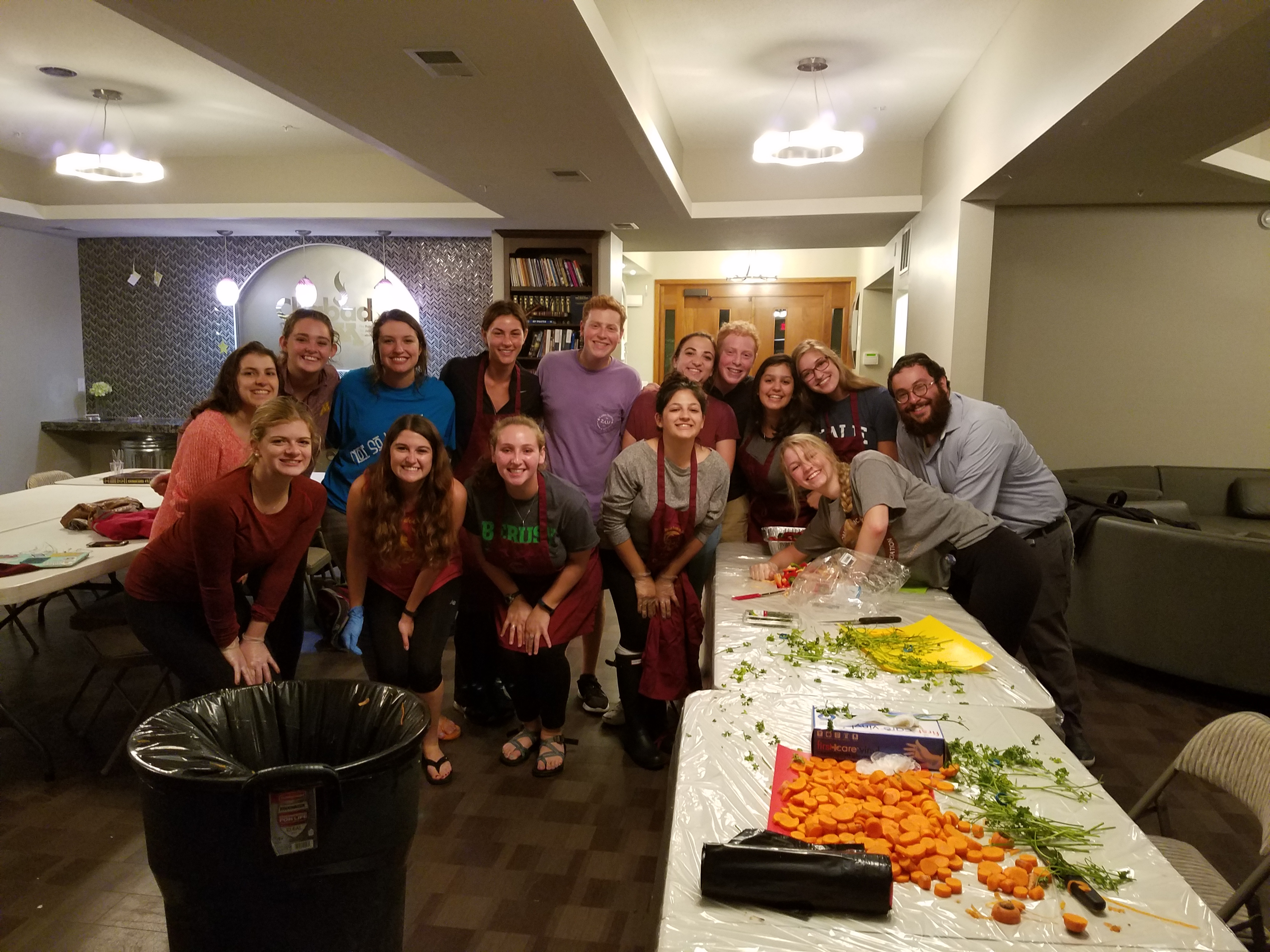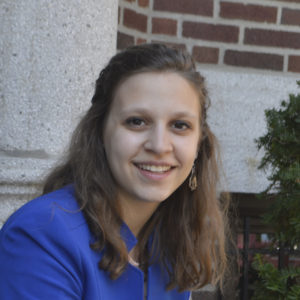Every Friday at 7:30 p.m., University of Minnesota students pile into the Steiner family’s Chabad House for dinner. As usual, there is homemade challah and matzo ball soup, but there’s also something special – the dinner was made by the students themselves.

That’s because of the Kosher Cooking Club, or KCC. Every Thursday, students get together with Chavi Steiner, the rebbetzin, and cook the entire Shabbat meal from scratch. The club began as a small gathering in 2013, but now, the Chabad kitchen has become a recipe testing ground, cooking class, and communal space.
“It feels like I’m cooking in my own kitchen,” sophomore Polly Lehman said. “Chavi is so welcoming and open to me and lets me do whatever I want. When I tell her, ‘Oh, Chavi, I have the best dessert idea for you,’ she says, ‘Great, do it. Give me an ingredient list. I’ll make sure you have everything.’”
Lehman said she uses cooking to relax and was frustrated when her freshman dorm didn’t have a kitchen. Because she didn’t have Friday classes, KCC became her way to destress at the end of the week.
“Living in the freshman dorms, I had no outlet to cook,” Lehman said. “To be able to start my weekend by relaxing in a place where I’m comfortable and in a place that’s welcoming, for me personally, it’s just relaxing.”
Steiner said KCC’s success means that more students feel connected to and comfortable in the Chabad community, even if they lack a religious background.
“People really want to work, and they feel satisfied even if they just cut vegetables for the chicken soup,” Steiner said. “They feel accomplished. They feel they did something for the Shabbat dinner. It makes students feel a part of it.”
It all began five years ago, just as the Chabad community was forming their first student board. Steiner said one of those students, now-alumna Shira Lavintman, was incredulous to hear that Steiner was up until one or two in the morning cooking for Shabbat.
Lavintman said there was a group of students on Chabad board who already cooked with Steiner on Thursday nights. Eventually, she realized it had potential.
“(We) would stay and help Chavi cook until ridiculous hours during the night on Thursday, and eventually I was just like, ‘Chavi, this should be an interactive, experiential club that we offer to students,’” Lavintman said. “First of all, it will empower people to come and cook with you and then encourage them even more because they’re using their hands to actually cook the meal.”
Lavintman then proposed the idea of a Kosher Cooking Club, originally titled the Kosher Food Club as a pun on KFC, the popular fast food restaurant. Steiner said she was initially skeptical because she couldn’t believe students would be willing to spend a night just cooking.

“Every Thursday, she would message loads of people and then we built up and became a club,” Steiner said. “We had music playing, and it turned into this fun environment to the point where we have so many people that not necessarily everyone is cooking. I make jobs literally out of nothing.”
As its popularity grew, Steiner said students who didn’t know a single thing about cooking also started coming. From there, it also became a space for students to grow comfortable with Jewish food.
“They learn new things,” Steiner said. “Some people come and they’ve never held a peeler in their life and they’re holding it backwards. So, I show them how to do it.”
Lavintman said, beyond teaching students how to cook just anything, the club demonstrates what it’s like to prepare for Shabbat.
“They get comfortable creating a Shabbos meal,” Lavintman said. “Whenever people decide, ‘Oh, I’m going to celebrate Shabbos on my own,’ it won’t be the first time they’ve ever done it.”
This year, as the biannual Sushi Shabbat was approaching, Lehman got another recipe idea. To make enough sushi for the large crowd, Chabad spends hundreds of dollars on a sushi chef – but, Lehman said, she knew how to make sushi herself.
Steiner said Lehman did a test-run by making sushi as a snack for KCC members. When that went well, she spent hours preparing sushi for more than 80 students.
“She came about four o’clock and she stayed until about 7:30,” Steiner said. “For three and a half hours she sat there rolling hundreds and hundreds of sushi rolls – different kinds, she was adding crunches to it. I don’t eat sushi so I have no idea, but I know what good sushi looks like.”
Lehman said KCC is special not only because it allows her to cook, but because Steiner makes everyone feel welcome. After making as many as 20 full-size challahs, Steiner takes the leftover dough and creates knot challahs for each student to take home at the end of the night.
“It’s the most welcoming, come-when-you-can, leave-when-you-need-to kind of atmosphere,” Lehman said. “You’re always greeted with a hug and you always leave with a hug and a challah.”
For Lavintman, KCC was always a place to spend time with the people who eventually became her family.
“It feels like any family cooking a meal,” Lavintman said. “It felt like everybody had their place, and stepped in when they wanted to. It was a great feeling. It didn’t feel like we were wasting our Thursday night, or we could’ve been doing something better. Everyone who came really wanted to be there.”
Hannah Bernstein is studying journalism and environmental science at Northeastern University.

